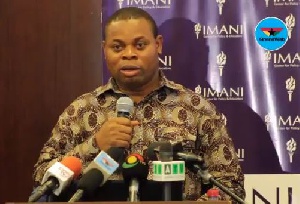 Franklin Cudjoe is President of IMANI Africa
Franklin Cudjoe is President of IMANI Africa
IMANI Center for Policy and Education will be conducting an audit of economic policies in Ghana with the goal of increasing economic freedom and prosperity on 16th July, 2018.
Economic freedom, extended to all, has been shown to generate positive social and economic outcomes, including diversification of the economy, increased economic growth, enhanced job creation, political stability, and the peaceful development of other freedoms.
The audit will be based on the Economic Freedom of the World Index. The index provides a comprehensive description of an economy, examining five economic policy dimensions: size of government, legal systems and property rights, sound money, freedom to trade internationally, and regulations.
In detail, the index shows the current status of economic policy and how the policy can be improved. It also provides models of world class policy that, if implemented, would bring renewed growth and prosperity to Ghana. Over 100 specially selected persons from academia, industry, government, diplomats, economic and international business associations, think tanks, CSOs and media.
Ms. Anita Nkrumah, a researcher with IMANI said ''Economic freedom, extended to all, has been shown to generate positive social and economic outcomes, including opportunity, diversification of the economy, increased economic growth, enhanced job creation, political stability, and the peaceful development of other freedoms.''
Sample Questions to be discussed during the audit:
1. Is government spending in Ghana efficient—in other words, do the people of Ghana get value for money?
2.Is spending politicised—in other words, is the money used to carry out essential government functions or is it used to curry favour with various interest groups and enrich those in government?
3. Has the government been able to use funds to provide essential services such as an honest rule of law and efficient regulation?
4. How can government consumption be reduced?
What projects and programmes receive government transfers and subsidies?
5. Are government transfers and subsidies put to optimal use?
6.Are there private sector alternatives for these programmes and projects that receive government transfers and subsidies? What can government do to enhance private sector interest in these projects?
7. Is tax collection fair and broad-based?
8.What are the key challenges to broadening the tax base?
9.How does the national identification system and digital addressing systems help? What gaps still exist?
10.What are the main drawbacks to systems put in place to curb tax avoidance?
11. How can the impartiality and integrity of courts be increased?
12.How can time and cost of contract enforcement be improved?
13.How can the legal system be made fair to all, the rich and powerful and the poor and weak alike?
14. How can police reliability be increased and the costs of crime decreased?
15. Is Ghana taking appropriate measures to deal with the threat of inflation?
16.Is the recent reduction in inflation sustainable in the long term?
17. What accounts for the relatively high volatility in inflation in Ghana?
18.What specific restrictions exist in holding foreign currency bank accounts?
19. What can be done to permit Ghanaians to hold foreign currency bank accounts?
20. What obstacles are there in Ghana to international trade?
21. Why are compliance costs so high for trade?
22.How can barriers to trade, both official and unofficial, be removed?
23.How can Ghana be opened up to international investment.
24.What are obstacles to hiring in Ghana?
25.What are the obstacles to firing?
26. Are laws protecting the labour market in Ghana implemented efficiently?
27. How can the following be reduced?
Administrative requirements
Bureaucracy costs
The need for “extra payments”